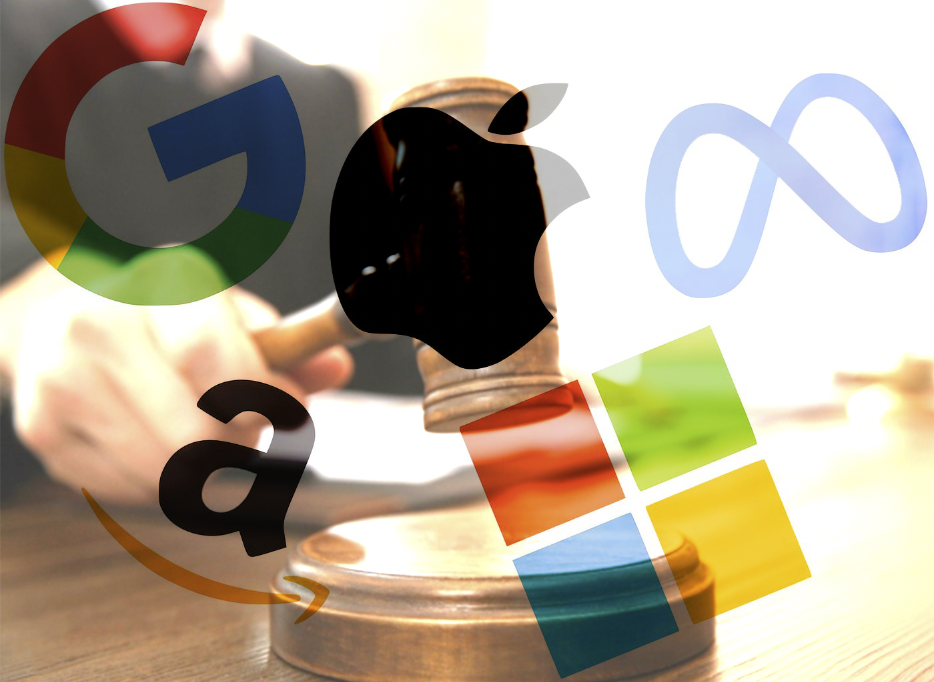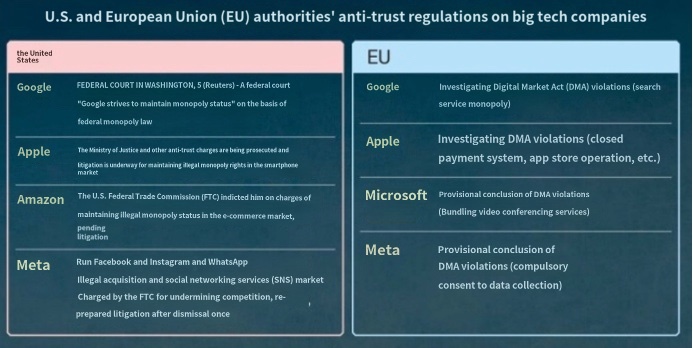
The lawsuit filed in 2020 by the U.S. Department of Justice and some state governments over Google’s monopoly practices was the first in a series of antitrust lawsuits against big tech companies such as Amazon, Meta and Apple, which began during the COVID-19 pandemic when the stock prices of big tech companies soared, and the industry and regulators watched closely considering their impact. Local observers say the ruling could not only affect other lawsuits but also fundamentally change the way big tech companies operate.
The U.S. federal court in Washington on the 5th (local time) ruled in favor of the Justice Department, which claimed that Google had maintained its market dominance by paying billions of dollars to Apple and Samsung Electronics, effectively put the brakes on various monopolistic operations that big tech companies have developed with rapid growth.
Google and other big tech companies have been constantly criticized for operating as monopolistic practices prohibited by U.S. federal monopoly law, such as collecting and analyzing user data to improve search algorithms and continuously raising online advertising prices through feedback loop or browser monopoly. However, it is the first time that the government has filed a lawsuit in earnest and won the case.

The ruling also seems to have played a role in the tradition of strict regulation of monopolies by U.S. law. “No company is above the law, no matter how big or influential it is,” U.S. Attorney General Merrick Garland said of the ruling. “The Justice Department will continue to strongly enforce our anti-monopoly law.” The significance of the ruling is not small in that it is a lawsuit against Google, which dominates the search market not only in the U.S. but also around the world.
When the ruling came out, there were a series of welcome voices from the U.S. civil society and the startup industry, which have been campaigning semi-circle. Luther Lowe, head of public policy at the Y Combinator, which makes initial investments in startups, wrote on X, “We will be able to reorganize the competitive structure to benefit ‘Little Tech’ by reducing Google’s gatekeeping power.”
It is expected to affect other anti-trust lawsuits by the U.S. government. In March, Apple was sued by the Justice Department and others for maintaining illegal monopoly rights in the smartphone market. Amazon, the world’s largest e-commerce company, was also sued by the U.S. Federal Trade Commission in September last year for degrading product quality and charging sellers excessively.

The European Union (EU) enforced the Digital Market Act (DMA) in March and imposed full-fledged regulations on abuse of power, including monopoly practices of big tech companies. If a lawsuit by a big tech company that protested the European regulators’ actions continues, it is expected to have an impact.
The Washington Post said that measures against Google will be announced in a separate ruling within a few months. It is suggested that a ban on Google from paying Apple and Samsung Electronics to set their search engines as default values is possible.
If Google loses in the appeals court, it could be forced to split up the company. The Justice Department could order Google to split its search business with Android, a mobile operating system. Bloomberg said, “If the order is issued, it will be the largest forced breakup among U.S. companies since the disbandment of AT&T in 1984. Some worry that Google has a strong influence among consumers and there is a possibility that the companies will continue to set Google as default without paying money.
The ruling could affect internal competition in the Big Tech industry. According to the Washington Post, Google emphasized that more and more people are searching for information through platforms other than Amazon, TikTok, and Reddit, or through artificial intelligence-based programs such as ChatGPT, on the grounds that its search engine is not a monopoly.
JENNIFER KIM
US ASIA JOURNAL



